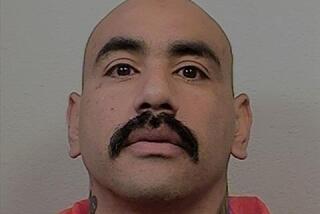Suits Spell Trouble From O.C. to U.N.
For Dennis LaDucer, getting a job as the second-highest-ranking official in the United Nations’ Bosnia police force was a second chance for a life in law enforcement.
His first career collapsed in 1997, when he was fired as Orange County’s assistant sheriff amid accusations from five women that he groped, propositioned and otherwise sexually harassed them.
Now his work with U.N. police has drawn a cloud of suspicion.
LaDucer was accused of visiting one of Bosnia’s notorious brothels at the same time the U.N. was supposed to be cracking down on the country’s prostitution rings.
And the head of the U.N. Office of Human Rights in Bosnia criticized LaDucer for fostering a “boys-will-be-boys” attitude.
The case, involving disputed accusations and contradictory investigative findings, has received much attention in the European press. The United Nations refuses to comment on the matter.
LaDucer, 57, denies visiting brothels, hiring prostitutes or acting improperly during his 18 months in Bosnia. Though his contract with the U.N. ended last year, he returned to Bosnia this summer to fight the accusations.
“Do I have this dark cloud over me?” asked LaDucer, who is now back at home in San Clemente. “There was no rule or regulation that I even came close to violating. I just wanted to do a good job and redeem myself after all of the other stuff.”
Accusations in O.C.
The Bosnia job came at a low point for LaDucer.
He had been a rising star in the Orange County Sheriff’s Department. A trusted aide to Sheriff Brad Gates who worked for the department for 31 years, he was viewed as a possible successor. Then, several employees of the department reported numerous instances of sexual harassment by the assistant sheriff that dated back several years.
Five women filed suit; Gates fired LaDucer in 1997, saying his one-time protege had violated department policies and conducted himself in an “inappropriate way.”
LaDucer denied the accusations and for three years fought the lawsuits, which the county eventually settled for more than $1 million. He and his wife divorced.
Broke, LaDucer needed a new job. He contacted DynCorp, an international company based in Texas that hires Americans for overseas work, including positions at the United Nations. In March 2000, DynCorp sent LaDucer to Bosnia as a U.N. police monitor.
A spokesman for DynCorp would not say why it decided to hire LaDucer, other than to confirm that he worked at the company “for a time.” LaDucer said he told DynCorp about his legal problems and said the lawsuits were settled.
Starting Over
LaDucer started his assignment in March 2000, at a desk job on the Croatian border, monitoring local police.
One of the country’s biggest problems was the trafficking of women for prostitution. Brothels, also called night bars, sprouted in the mid-1990s as the country began rebuilding after its war. Lured across the border with promises of legitimate jobs, women were forced to dance at Bosnian clubs and perform sex acts; those who refused were beaten.
Even before LaDucer arrived, there were accusations that some U.N. personnel were patronizing the very brothels they were supposed to be helping local authorities shut down. Human rights groups criticized the U.N. as unwilling or unable to control its 1,600 employees from 40 countries.
Stung by the accusations, U.N. officials in July 2001 created a new team to combat the prostitution rings. By then, LaDucer had been promoted as the task force’s deputy commissioner, the No. 2 job in the police force.
A few months later, a team of U.N. investigators began interviewing former prostitutes, asking if they recognized U.N. personnel as customers.
A Romanian prostitute identified LaDucer from a photo lineup. She said he was one of several “internationals” she’d seen in July while working at the Vila Bar, a brothel in Doboj.
Accusations in Bosnia
LaDucer insisted to his superiors that his accuser was mistaken, offering his calendar and travel logs as proof. His stint with the U.N. ended in November, and LaDucer says he returned to California thinking the issue was resolved. But in late June, LaDucer’s name surfaced in a legal battle in Britain.
Former U.N. police monitor Kathryn Bolkovac was suing DynCorp after having been fired from the police force in April 2001. The case was heard in Britain by a government labor board because DynCorp’s business activities in Europe are covered by British employment law.
Bolkovac, of Lincoln, Neb., alleged that she was fired in retaliation for a memo she sent to 50 top U.N. officials complaining about U.N. personnel patronizing Bosnian brothels.
Bolkovac’s memo didn’t identify any officials by name. But Madeleine Rees, a British attorney and one-time head of the U.N. Office of Human Rights in Bosnia, did. She testified on behalf of Bolkovac that LaDucer, as deputy commissioner, displayed a cavalier attitude about prostitution and visited a brothel himself.
Rees testified that after Bolkovac was fired, LaDucer wrote a memo critical of her that appeared designed to hurt her credibility. Rees also cited a U.N. investigation that concluded LaDucer shouldn’t be rehired and that his “persistent denials raise serious questions about his integrity and his professionalism.”
The London press reported the news with gusto, dubbing the story “The Sins of the Peacekeepers.”
Trying to Clear Name
Back in San Clemente, LaDucer said he felt helpless to answer the accusations being made against him in Britain. So he flew to Bosnia to meet with U.N. investigators in an effort to clear his name. He said he gave officials the results of a lie-detector test he took in California that he said showed he was telling the truth about the brothel visit.
U.N. officials declined numerous requests from The Times to discuss the case or details of LaDucer’s departure. But LaDucer provided two letters written to him by U.N. investigators, dated July 25, concluding there was no evidence that he had ever been at the brothel. One letter also recommended that he receive an apology.
LaDucer’s sense of vindication was short-lived.
No apology was forthcoming, and two weeks after he received the letters, the British labor board ruled in Bolkovac’s favor. Among its findings, the panel said LaDucer’s memo was proof of “virulent animus” against her. The panel did not address whether LaDucer had visited the brothel.
Another hearing next month will determine how much compensatory damages Bolkovac is entitled to receive from DynCorp.
LaDucer recently got a new job in Orange County; he declined to name his employer. He and his wife have reconciled.
But he knows the Bosnia scandal, on top of the Orange County sexual harassment cases, has further hurt his reputation.
“It’ll never go away, and it’ll never be cleared up,” he said. “I’m always coming from behind. It’s embarrassing. People look at me say, ‘That stupid SOB. He can’t stay out of trouble.’ ”
More to Read
Sign up for Essential California
The most important California stories and recommendations in your inbox every morning.
You may occasionally receive promotional content from the Los Angeles Times.






